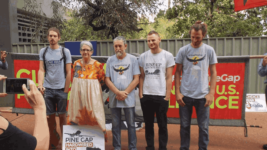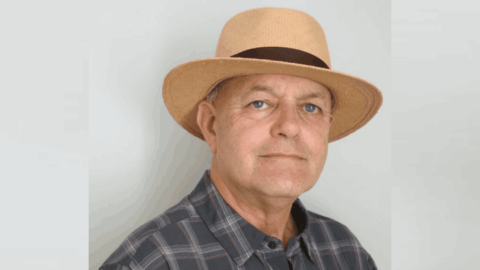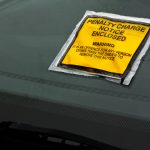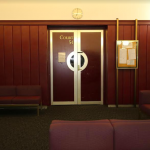The Advantages of Activists Self-Representing: An Interview With NT Lawyer Russell Goldflam

Over the last 12 months, several states tightened the screws on the ability of climate and environmental activists to raise awareness around these issues, via nonviolent civil disobedience actions that disrupt business as usual to capture public attention.
The NSW Coalition government was the first as it enacted an antiprotest regime last April, that sees serious time and financial penalties applied to obstructing roads, bridges, tunnels or major facilities, whereas, in the past, these transgressions were dealt with, for the most part, as summary matters.
The new laws have further been accompanied by a set of extreme bail conditions that the NSW police began applying to those engaging in climate actions back in the spring of 2019.
Beyond War activist educator Margaret Pestorius is subject to such bail measures, after having been charged under the NSW protest laws last June, and she’s raising the need for rights-based arguments to counter these conditions, as well as the importance that activists have their say in court.
Getting the message across
Pestorius has long been conducting acts of civil disobedience, with one of her most daring antiwar demonstrations having involved sneaking into the Pine Gap facility in central Australia with four other activists to raise awareness around the installations use in US drone strikes.
This September 2016 nonviolent direct action saw the protesters nabbed by the Australian Federal Police, and charged with unlawfully entering a prohibited area, contrary to section 9 of the Defence (Special Undertakings) Act 1952 (Cth): an offence which carries seven years prison time.
Northern Territory lawyer Russell Goldflam provided counsel to Pestorius and the rest of the activist defendants. However, the legal professional did not represent the group during their trial in the NT Supreme Court, as each one of them represented themselves.
Indeed, Goldflam argues that in this case, as well as in certain other civil disobedience trials, a better outcome can be obtained in terms of what the activists want to achieve when they act on their own behalf, as they have more leeway to present their political case to those present in the courtroom.
Spreading the law
The NT criminal defence lawyer considers that the benefits the path of self-representation can provide to those who end up in court on criminal charges motivated by advancing a social justice or climate cause has been widely overlooked within the Australian justice system.
And Goldflam further considers it incumbent upon the law profession to ensure that it educates the wider community on legal matters, and he advocates that the best way to do this is via community workshops, where the focus can be on a particular aspect of law relevant to those gathered.
Sydney Criminal Lawyers spoke to NT lawyer Russell Goldflam about the advantage Pestorius and her fellow activists gained from representing themselves in court, his thoughts on a rights-based approach to extreme bail conditions, and his admiration for the Environmental Defenders Office.

Over your legal career, you’ve represented a number of social justice activists in relation to direct actions they’ve taken. And as a lawyer, you consider it favourable to permit activist clients to speak out in court.
Russell, what sort of circumstances do you encourage activists to speak in court? And what are the benefits of doing this?
As a lawyer appearing for a client, you’re pretty constrained with the sort of things you can say.
Firstly, you’re not the client. You’re not supposed to express your own views and opinions. You’re supposed to make submissions and arguments about the law, to produce evidence and cross-examine witnesses.
You’re not there to push a political barrow. So, that limits what you can say when you’re representing a civil disobedience client, who’s come before the court only for political reasons, not for criminal reasons.
What they want the court to hear is often the reasons they engaged in conduct about politics, beliefs and policies. So, it’s difficult for a lawyer to properly present that material to a court.
In my experience, another way of approaching the task of representing protesters is to give them the tools that they need to be able to discharge their functions in the court effectively as an unrepresented person.
Then, the protester is at liberty to make the points that they want to make. If it’s a jury trial, they might get to address the jury in a way that no lawyer would ever be permitted to do by the judge.
But because they are lay accused, they’re given a certain amount of leeway by the presiding officer and that can work really well.
I’ve seen it work really well. Some of the people I have provided assistance to have done a far more effective job than I could possibly have done.
So, you’re advocating for protesters to self-represent in court with assistance provided by legal representatives.
In appropriate cases. It is not always appropriate. And it doesn’t necessarily apply to all parts of a case.
But, yes, the potential for that has not yet been realised as much as it could be in the Australian justice system.
You’ve provided this sort of legal assistance to Beyond War activist educator Margaret Pestorius in relation to nonviolent direct actions carried out at Pine Gap. And as part of these proceedings, she was able to address the court on her own terms.
What did this entail? And how did her input support the running of the case in a way that it wouldn’t have been possible to do if a lawyer had been presenting it?
Margaret was one of a group of five protesters who entered the prohibited area at Pine Gap, and were arrested and charged with serious offences, carrying a maximum of seven years imprisonment, under the Defence (Special Undertakings) Act.
The prosecution insisted on these matters being taken to the NT Supreme Court for a jury trial. That was what the protesters wanted as well because they wanted to get as much publicity as possible for the cause that they had engaged in this conduct in support of.
So, Margaret and her fellow protesters were arraigned and appeared in front of a judge and jury. And although I, some of the time, sat in back of the room and watched, I never appeared for them in the Supreme Court, certainly not in the trial itself.
I did appear for them in interlocutory phases of proceedings, because they all lived interstate and it was just for practical matters, such as trial dates and making directions. It was just more convenient for everybody that they be represented.
But when it came to the pointy end of these matters, all of the accused decided to represent themselves, in part because Legal Aid, where I was working at the time, wasn’t necessarily going to be available to any of them.
That was because although the charges were serious, it seemed unlikely that they were going to go to gaol if found guilty.
They were found guilty, and they didn’t go to gaol, even though the prosecution did press for gaol time in some cases.
So, it would have been ruinously expensive for them to engage a barrister and a solicitor to conduct their trial. In this way, they didn’t have much choice on how to go about it.
But behind the scenes, after court every day, I would meet with them and assist in planning how to deal with what was going to happen next and with the various charges they were facing at trial, as none of them were experienced litigants, let alone lawyers. They didn’t have any legal training.
As you can imagine, it was a fairly intimidating and stressful experience going through a jury trial in this way, with interventions from the Commonwealth, as it sought to exclude certain evidence on public immunity grounds and all sorts of bomblets that were thrown as we went along.
They also engaged the assistance of a pro bono senior counsel in another jurisdiction, who was available to try and deal with the more complex issues that were raised during the trial.
But in the end, my view was that they did a terrific job at bringing to the attention of the people in the courtroom – including the jury but not just the jury – the issues that led them to engage in the conduct that saw them being charged.
Clearly, the jury in that case was very concerned and troubled about what they heard about Pine Gap. Expert evidence was given on behalf of the accused about what happens at Pine Gap and what it is for. That was allowed in by the trial judge.
Everybody got to hear it. And it was an important political and legal event that happened in Alice Springs.
So, in this way, the trial following arrests due to civil disobedience actions can be used to continue to raise public awareness around the issue the protest was carried out in relation to.
That’s right. The actual conduct of climbing over a fence and walking over a creek bed in the middle of the night in the dark without anybody seeing you except for the surveillance systems of the defence facility you’ve just entered, that in itself is an act which if nobody had been charged, arrested and tried, then nobody would have known about it except for a few spying eyes.
So, the real leverage that they got from staging this was in the glare of publicity they received in the public courtroom.
Activists are usually in need of a criminal lawyer after they’ve partaken in civil disobedience actions carried out in order to raise public awareness in relation to a cause.
In providing representation to activists, do you consider it incumbent upon lawyers to have a thorough understanding of the cause their clients are trying to advance?
There is no simple answer to that because it very much depends on what phase of the case you are talking about.
When people are arrested, the first thing to do, as a criminal lawyer, is to investigate the possibility of getting their liberty back by way of a bail application.
The application must be done as expeditiously as possible, and you don’t get the opportunity to go home and read a few books about political theory and the history of the environmental movement, or Pine Gap, or whatever the issue is.
You have to make the bail application on the spot with a person you have never met before, just like all the other clients that a duty lawyer, or a Legal Aid lawyer, has to provide services to every day of the week.
On the other hand, if you are involved in a later phase of proceedings, such as the trial, as with any client, you need to find out who they are, what it was that motivated them to engage in the conduct that has brought them before the court, what their background is, what their values are and what their history is.
That goes for everybody that you represent in a serious matter, and it goes in the same way, in my view, to political protests. Yes, you should find out about their politics.
But should you adopt their politics? No. That is not your job. If you are going to be representing them in court, your politics are irrelevant, but you really need to understand who you are acting on behalf of because you are in their shoes in the courtroom.
Over the last 12 months, a number of Australian jurisdictions have rolled out new antiprotest regimes characterised by draconian penalties, and those charged under these laws are then being hit with extreme bail conditions.
Pestorius is calling on lawyers to make rights-based arguments against these conditions, so that the application of these measures can be countered by the various defendants that they’ve been applied to using arguments that would apply to all.
In your opinion, if a police force is presenting a whole movement, in this case climate defenders, with a set of bail conditions designed to undermine future demonstrations, should activists’ legal representatives be acting to prevent such measures?
Activists’ legal representatives are like anybody’s legal representatives. They should act on instructions. That is pretty basic. And not acting on instructions is a serious breach of the rules of professional conduct, as any lawyer would know.
But I understand what Margaret Pestorius means when she talks about a rights-based approach. But I’m a bit of a reactionary, in the sense that, I like to go back and look at the statute, and in this case, it’s the statute in NSW we’re talking about.
Section 20A of the Bail Act 2013 (NSW) sets out a series of rules that stipulates that you can only apply bail conditions that are necessary, and you can’t impose more restrictive conditions than are reasonably necessary to address a bail concern.
The bail conditions need to be reasonable, proportionate to the offence and appropriate. They must be no more onerous than necessary to address the bail concern.
So, if you’re appearing for a protester for a bail application in NSW, despite recent amendments and the apparent manner in which the police are approaching these bail matters with very stringent restrictive conditions, section 20A is still there.
So, if your client instructs you that they don’t want those stringent conditions, then I would have thought that it arguable that the restrictions sought by the police would be inconsistent with section 20A.
In other jurisdictions around Australia, certainly in the Northern Territory where I was practising, there are similar measures within their bail legislation that also reflect the fundamental principle that with the presumption of innocence, a person is entitled to their liberty.
Another point Pestorius has made in relation to lawyers not countering draconian bail conditions with rights-based arguments, is that activists aren’t then being provided with the defensive logic that they could replicate when they’re unable to access legal representation.
So, what’s your point of view on lawyers acting as legal educators for their clients? Do lawyers have a responsibility to propagate a greater understanding of defensive law to the community of social activists?
It’s not necessarily possible for a lawyer who’s appearing on a particular bail application to simply have the time to step out of court and spend an hour or two explaining the Bail Act.
But the legal profession and the legal system do have a responsibility to provide community legal education.
This is a specific form of community legal education. There are a number of agencies all over Australia that run community legal education programs, of course, one of them being the Legal Aid Commission, and it’s a really important role.
I have certainly given CLE (community legal education) to a group of people who were specifically there to engage in a blockade of a uranium mine. I have also given CLE to those planning to protest as part of the peace movement.
It’s a useful thing to do. And it is much more efficient to do it with a group of potential defenders, clients or defendants than it is one-on-one after the event, as forewarned is forearmed, meaning it’s better to do it in advance with a group of people as it is better to do it efficiently.
That also means that it helps the solidarity of the group, because if they have the same information given to them about the legal process, it helps with the problem where different people involved in the same action are given different advice from different lawyers, which muddles opinions.
It is better to do this in an organised community way.
So, in the case of the extreme bail conditions being repeatedly applied in NSW, you would suggest activists get together in a workshop and strategise about how they could counter them.
Indeed, and they should be able to access the services of a lawyer who knows about the Bail Act and knows about these issues.
There are plenty of lawyers with a strong interest in these issues in the legal community.
Some of them work for public law agencies, like Legal Aid Commission, but others in private practice have a strong pro bono interest. So, there would be no difficulty in attracting their support.
Some of the groups that I’ve heard about that are involved in climate action do have workshops with access to quality legal information before they embark on their protests. And I’d encourage that.
And lastly, Russell, over recent years, the concept of “movement lawyering” has been growing. This is an understanding whereby legal representatives should be seen to be “lawyering with” their activist clients rather than “lawyering for” them.
In this way lawyers take a proactive approach in furthering the cause that their client is campaigning for.
In your understanding, Russell, in this time of mounting crises, should lawyers representing activists and organisers be playing a more proactive role in furthering the causes of their clients? What’s your take on movement lawyering?
There are lots of organisations out there that have taken up this course. One in particular, that I am a huge fan of, is the Environmental Defenders Office, which has branches all over Australia.
It would be fair to describe the EDO as a movement lawyering organisation. That doesn’t mean that when the lawyer is in court arguing a case, that they have their heart on their sleeve, their political program pinned to their chest and a button on their hat announcing who they’re going to vote for.
As I said earlier, in court, you’ve got to put all that aside and do your job as a lawyer. You have got to be intractably neutral in the way that you present your arguments to the court.
When it comes to your own view, you should never say, “I think” or “My opinion is”, you should say, “I submit”. It’s elementary in fundamental law, although sometimes it seems to be forgotten.
So, movement lawyering by supporting organisations that are set up to advance political causes is a wonderful thing to be encouraged and supported.
But one also needs to bear in mind the fundamental difference between being a political activist outside of court and being counsel inside a court.







